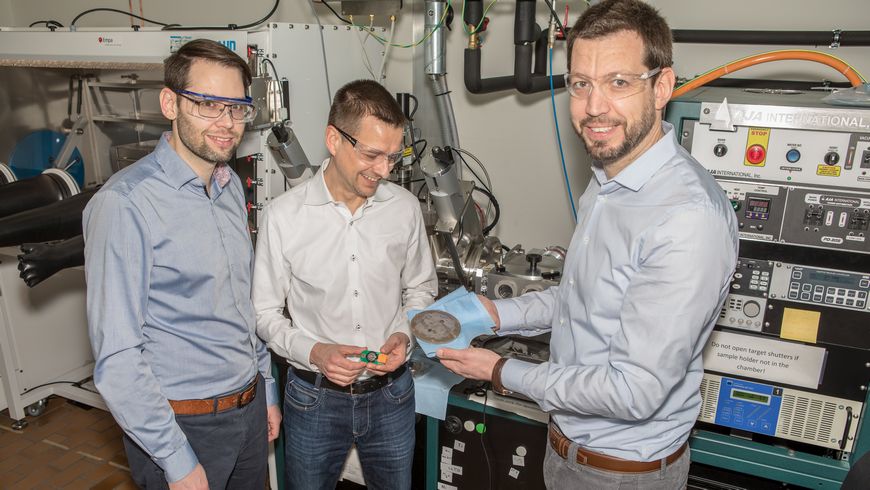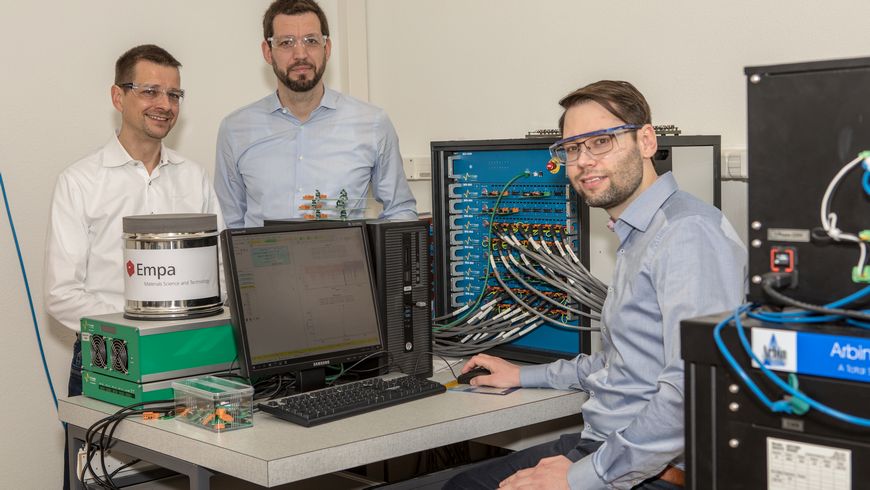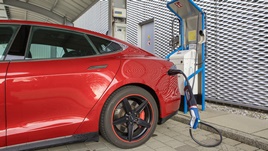Next-generation lithium-ion batteries
Kick-off for European battery research project SeNSE
On Monday, February 10, 2020, the European battery research project SeNSE was officially launched. Over the next four years, five research institutes and six industrial companies from seven European countries will work together to find solutions for the next generation of lithium-ion batteries. Also on board as a partner is the Swedish company Northvolt, which intends to set up two large-scale production facilities (gigafactories) for vehicle batteries in Europe in the next few years. The research project is coordinated by Empa researcher Corsin Battaglia and his team. The EU is supporting SeNSE with 10 million euros.

The demand for batteries for electric cars will increase dramatically in the next few years. At present, more than 90 percent of these batteries come from Asia. The EU Commission has therefore set up the "European Battery Alliance" in 2017 to build up competences and production capacities for this key technology in Europe. Experts estimate that the European demand for lithium-ion batteries alone will require 10 to 20 so-called "gigafactories" – large-scale production facilities for batteries.
Generation 3b lithium-ion batteries
The research in the SeNSE project is part of this "European Battery Alliance" initiative and is supported by the EU research funding programme Horizon 2020. The eleven research partners of SeNSE – five research institutes and six industrial companies – are conducting research on next-generation lithium-ion batteries – the so-called "generation 3b". In contrast to current traction batteries, this next generation will have higher energy density and improved cell chemistry and battery management system: Instead of pure graphite anodes, the aim is to use silicon-graphite composites. The content of critical cobalt in the cathode will be further reduced. New additives in the electrolyte and interphase design approaches will slow down battery aging and extend cycle life. New sensors will also contribute to a longer service life and improve fast charging capability by supplying data from inside the battery cells to the battery management system. This data should allow a much more refined temperature management compared to today's lithium-ion cells.
Series production and recycling
The sustainability of generation 3b cells is also expected to exceed that of the current generation: The cathode will be manufactured without the use of flammable and toxic solvents, which will greatly simplify the series production of the cells and reduce their cost. All aspects of SeNSE re-search are geared towards producing the next generation of cells in European gigafactories. To be competitive in the future, cost-effective and raw material-saving production methods are therefore crucial. The SeNSE project also considers the second life use of decommissioned vehicle batteries as stationary storage units and, finally, the recycling of the batteries. The research partners of Empa (CH), which is leading the project, are the Westfälische Wilhelms-Universität Münster (D), the Forschungszentrum Jülich (D), Coventry University (UK), the Austrian Institute of Technology (A), and the companies Solvionic (F), FPT Motorenforschung (CH), Lithops (I), Northvolt (S), Enwires (F) and Huntsman Advanced Materials (CH).

On the way to the gigafactory
The Swedish company Northvolt plays a decisive role in the research project. The company was co-founded in 2016 by two former Tesla employees, who were involved in the construction of the Tesla gigafactory in Nevada (USA). Northvolt is currently planning the first European gigafactory with a production capacity of 32 GWh per year to be built in Sweden. A further gigafactory with an annual production of 16 GWh is to be built as a joint venture with Volkswagen in Salzgitter (Germany). For comparison, the Tesla Gigafactory in Nevada currently produces around 30 GWh of batteries per year, according to management.
Experts from Northvolt will advise the SeNSE researchers through regular briefings. By the end of the project, a series of battery cell prototypes will have been developed. A demonstrator with 1 kWh storage capacity will demonstrate the capabilities of the battery cell generation 3b. At the end of the project, the production technology developed will find its way into industry in the form of patents. The SeNSE research project ends after 48 months in spring 2024. Supported by the EU under grant agreement No 875548.
Outlook: solid-state batteries - generation 4b
Corsin Battaglia's team at Empa is involved in another European research project: The project, called SOLiDIFY, looks even further into the future and is developing future-generation batteries - so-called solid-state lithium-metal batteries. In contrast to today's lithium-ion batteries and those of generation 3b, these solid-state batteries will no longer contain any liquid, flammable components. They are therefore safer and more tolerant to elevated temperatures, can deliver higher power, and can be charged and discharged faster.
According to experts, these batteries – called generation 4b – could be ready for the market in about ten years. At half the weight and half the size, they should deliver the same storage capacity as today's lithium-ion batteries. Production costs are also expected to be cut in half. New electrode architectures are necessary, as are cost-effective innovative production methods for the cathode of these batteries. The anode will consist of metallic lithium. The SOLiDIFY research project started on January 1, 2020 and will also run for 48 months. Supported by the EU under grant agreement No 875557.
Dr. Corsin Battaglia
Empa, Materials for Energy Conversion
Phone: +41 58 765 4131
Rainer Klose
Communications
Phone +41 58 765 47 33
redaktion@empa.ch
| Audio |

Radio programme on Radio SRF2 Wissenschaftsmagazin in German of February 12, 2020
-
Share
